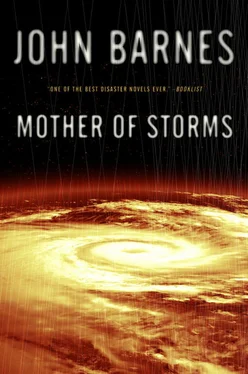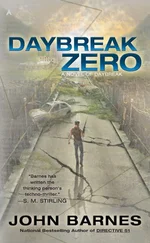The salt rain has been falling so fast and hard that the building engineer has diverted the rain pipes into the building’s power drains. At eighty stories taller than the World Trade Center, he explained to them earlier, the building is too tall to drain easily by gravity—so he has pumps on every floor. Now, with the quarter of a million people who work here mostly gone, he’s been able to divert most of the power drains to pushing water from the roof and the terraces down into the sewer system.
The Dance Channel itself never occupied more than the top fifteen floors anyway, and even though the building was thick and squat in its lines, it swayed too much up there on windy days for them to use the Top of the World Studio much.
Karen was very lucky to get one of the micropartments—a nice word for “dorm rooms”—in the building, and since she works on the eighty-first floor, she has been commuting by elevator for a long time. There really isn’t anywhere else for her to go, and the super—a big, muscular, older man named Johnny Wendt—told them that anyone who wanted to could try to ride it out here. There are maybe a thousand of them now, gathered in the floors between forty and fifty, far enough up not to drown and—if they’re lucky—far enough down not to be carried off by the wind.
It’s not much, but it beats being outside, she thinks. There is an enormous jam of people and vehicles down there, and none of them seem to be going anywhere when she can see them, under the streetlights, through the salt rain. Johnny has signs out inviting people to come up—between the cafeterias and stores in the building, and three different hotels, people could be fairly comfortable—but anyone who is in the street now is trying to get elsewhere, either to join family or because they don’t trust a tall building.
“Damn foolish,” says a voice behind her. She turns and sees it’s Johnny standing in the corridor, his shirt soaked with sweat, his coverall much dirtier than she’s ever seen it. “At least all my staff stood put. They understand that this place is as stable as a small mountain. We could save ten thousand lives here if people were smart enough to get inside.” He peers at her for a second, and then says, “APDP. Eighty-first floor. Third desk to the right as you go in.”
“Right,” Karen says, glancing down. It makes her feel a little shy, these days, when anyone notices her; she’s changed a lot since she used to audition and pal around with actors. Perhaps not for the better….
“Well, I assume you’re smart enough to stay away from the windows if the wind picks up,” he says, “but we’re rated up to Beaufort 30, and the storm isn’t supposed to come near us. It’s the Hudson we have to fear.”
Water is already running a foot deep in the street below, and Karen shudders. “Will the building take it?”
“It’ll have to. I’ve got a brand-new music-and-video rig in my apartment, and it’s not paid for yet. The company would never let anything happen to it.”
She laughs, not because it’s funny but because he’s a nice guy and clearly wants her to like him. He steps a little closer and looks down into the street as well. “Look at them. Can’t they figure time? They won’t get off the island before the worst of it hits. The surge is already on its way down the river.”
“How high will it come?”
“Call it a hundred feet or so. That’s what the meterology guys call an order-of-magnitude estimate. They mean more than ten and less than a thousand.”
She sighs. “Is there anything we can all do?”
“I’m afraid most of you are just passengers,” Johnny says. “Naw, I’m just looking to see if the streets are clear so that—shit.”
At his voice, she looks and sees it too, even in the dim gray shapes up toward Times Square: a wall of water and people running from it. There is nothing at all for anyone to do; Johnny is on the phone telling his people to get out of the lower floors if they’re there, but all that Karen sees is the gray-black surge below her, washing up to the third story, sweeping people along in it like struggling insects. There is a faint shudder through her feet as the surge wraps around the building.
“Suzette? Is that door holding?” Johnny is asking. “Okay, is everyone out? Check in with me!”
There’s a very long pause.
“Okay,” he says. “Go with the plan. No sense waiting any longer—no one else is coming through the lower doors.”
“Er, what’s the plan?” Karen asks.
“Anhh?” He hasn’t heard her because she spoke very softly. Outside, there is now a rushing river in the streets; Broadway is filled with dark boiling water in the lights that shine down on it from the Dance Channel Tower.
“Uh, what plan? Just curious.”
“Hang on—” he says, and raises a finger. He listens to the phone, says, “Good, right, okay,” several times, and finally sighs. “Well, that’s that. The plan is, we’re flooding the lower floors, using the water from the rain pipes and the power drains. So we’re putting clean water into the building up to a bit past 100 feet. With luck it will equalize pressures, to some extent, and make us a bit less likely to get cut off at the base and go over in the storm.”
“Doesn’t it kind of damage things?”
“Not like having the building fall over would.” He grins at her, and she smiles back. When did she get this shy? Obviously he’s hanging around because he wants to talk to her, and he’s a nice guy.
Her phone rings, and she lifts it from her belt. She turns it on to find—“Mary Ann!”
“Yeah, I’m taking one of my breaks to see if you’re okay. Did you get out of Manhattan?”
“No, but I don’t think I could be any safer,” she says. “Nowhere on the East Coast is safe, but at least I’m in a building that should stand up to this.”
“That’s something. Take care of yourself if you can.”
“You too.”
They chat for a few minutes; one thing you have to say for her, though Mary Ann changed a lot as she became Synthi Venture and her career took off, she didn’t get stuck on herself and she stayed in touch. There’s not a lot to say—and there’s always the possibility that this is their last conversation, Karen realizes, something Mary Ann is being careful not to mention—but they don’t need to say much.
When they click off, minutes later, Johnny is still standing awkwardly in the hall, and finally he says, “I couldn’t help overhearing, uh, and seeing a little of your screen, and, uh—”
“Mary Ann Waterhouse used to work next to my desk. We used to go to Equity calls together, back when I still thought I had a career on Broadway,” Karen says, a little proudly. “I knew her a long time before she was Synthi Venture.”
Johnny nods, clearly impressed, and now it looks like he’s a little shy.
She glances out the window, and says, “Of course, nowadays you could have a career on Broadway running a submarine.”
Now it’s his turn to give a nervous laugh. They stand there for a long time, watching the water get up to the eighth floor; there’s nothing much for either of them to do. The powerchips will keep the building running, and hardly anyone needs data patterning.
Eventually someone shouts about what’s happening on the downtown side of the building, and they run around to see what the searchlights can show them. Buildings as tall as forty stories are going over, but the World Trade Center seems to be holding firm.
Around dawn they eat; the water is still rising, but slowly, and finally they stagger off—to separate apartments, Karen thinks a little wistfully—and fall asleep.
She need not have worried; there will be plenty of time. It is not until October third, ten days later, that the water will fall far enough, and enough rubble will be cleared, for them to leave the building. By that time, millions of New Yorkers will be dead, and the world changed utterly, but Johnny and Karen’s greatest discomfort during the whole thing will be that, during the last week, the building ran out of soda, peanut butter, and mayonnaise.
Читать дальше












